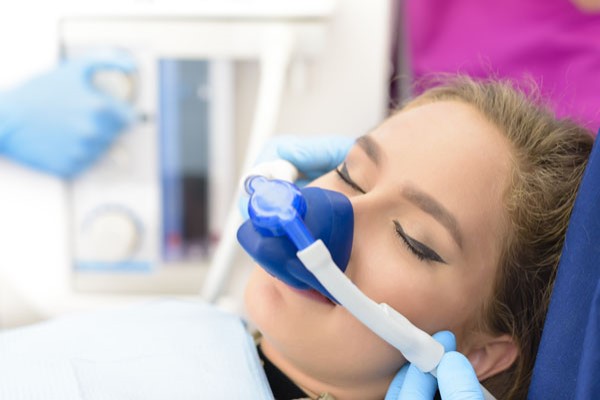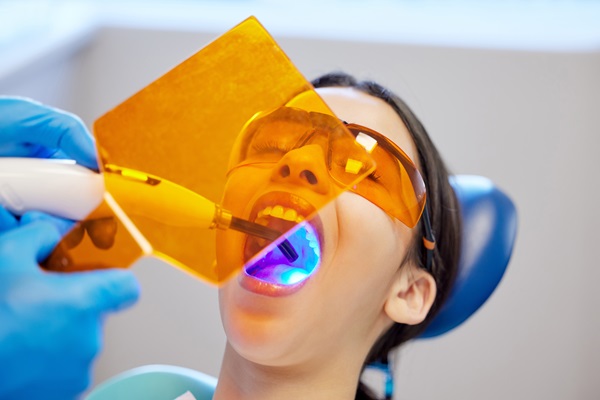Why a Dentist Would Recommend Sedation Dentistry

Sedation dentistry involves using medications to induce a state of extreme relaxation while you are having an oral procedure done. It does not make you unconscious, but it does significantly decrease your sensitivity to pain. It can also induce a state of short-term amnesia so that you have little memory of what happened during the procedure once it is over.
Sedation can benefit both you and your dentist. It can make the procedure easier for you to endure, and it can make the dentist's job much easier. Your dentist may recommend sedation dentistry for you or your child under certain circumstances. Not all patients have sedation for every procedure, but patients of all ages can potentially benefit from it.
5 situations in which a dentist may recommend sedation dentistry
Your dentist may be more likely to recommend sedation for you or your child under one of the following circumstances.
1. Difficulty sitting still
Some dental procedures can last an hour or more. During this time, the patient has to remain as still as possible or it could disrupt the dentist's work. Some people, especially young children and people with disabilities have trouble staying still for long periods of time. Sedation can help keep the body relaxed, even when used in relatively mild forms.
2. Teeth and gum sensitivity
Teeth and gums can become sensitive for many reasons. It could happen due to situations beyond your control, such as your age. Tooth sensitivity is most common between the ages of 25 and 30. It could result from improper technique when brushing or flossing. It could be a sign of an oral health problem, such as tooth decay or gum disease, or it could be a symptom of an underlying medical condition, such as diabetes.
Sensitivity can prevent your dentist from giving you the treatments you need to preserve your oral health. Sedation dentistry can relieve the sensitivity to facilitate the necessary procedure.
3. Gag reflex
Your gag reflex prevents you from swallowing foreign objects. Without it, you could choke. Everyone has a gag reflex, but in some people, it is more sensitive than others. If you have a high gag reflex, it could make oral health procedures more difficult for your dentist and much more uncomfortable for you. Sedation relaxes your gag reflex so that it becomes less reactive.
4. Anxiety relief
While going to the dentist is generally a safe and painless experience, some people have an irrational fear of it. Maybe this stems from a traumatic event of some kind, or maybe it is a behavior that they learned from their parents. If going to the dentist makes you anxious, you may avoid your appointments. This can cause your oral health to deteriorate which, ironically, may require you to spend more time at the dentist to receive more extensive treatments.
If you have dental anxiety or phobias, sedation dentistry can make dental treatments more tolerable for you. If your anxiety symptoms are severe, it may be possible to have sedation even for routine cleanings or examinations in the hopes of preventing more serious oral health problems. It can make the time in the chair seem to pass more quickly, and you may not remember the experience when it is over.
5. More efficient dentistry
A dental patient who is not sedated can only tolerate so much dental care at one time. It may not be possible for a dentist to complete the procedure before the patient has had enough, so it may be necessary to schedule multiple appointments to perform all the required dental work. Sedation increases the patient's tolerance to the point that it may be possible to complete all the work in one appointment. This can be good for you if you have anxiety because it means you do not have to come back to the office for multiple visits and keep putting yourself in a situation where you feel uncomfortable.
Steps your dentist should take before giving you sedation
While sedation has many possible benefits, not everyone is a candidate. To determine whether sedation dentistry is appropriate for you, your dentist should discuss your medical history with you, including your current medications. You should also receive information from the dentist regarding the risks and benefits of sedation. Go over this with your dentist and ask questions about anything you do not understand so you can make an informed decision about whether to have the sedation.
Conclusion
Patients of all ages can potentially benefit from sedation dentistry. Your dentist should explain the possible benefits to you as well as the risks.
Request an appointment here: https://www.mytotaldentistry.com or call McCarthy Dentistry at (740) 546-5178 for an appointment in our Marietta office.
Check out what others are saying about our dental services on Yelp: Sedation Dentist in Marietta, OH.
Recent Posts
Many people believe that sedation dentistry is risky, but this is far from the truth. Sedation has helped many patients struggling with dental fear or anxiety tolerate dental procedures. It makes the process safe and more comfortable to deal with. If you avoid visiting the dentist due to anxiety issues or past unpleasant experiences, then…
Thinking about using sedation dentistry? If you feel any anxiety or fear when going to the dental office, finding out more about your dental sedation options is a great idea. It is essential that you go to your regular dental appointments, as these support your good oral health. When anxiety or fear gets in the…
Many people struggle with dental anxiety, including both children and adults. Often, dental anxiety occurs prior to a dental appointment or procedure. Typically, people have feelings of anxiousness, nervousness or even fear. The causes are various, and each person is different, meaning that they may have specific things that trigger their dental anxiety. Outlined below are…
Dental anxiety is a serious medical issue that affects about 20 percent of people in the U.S. This often results in the person finding every excuse in the world to avoid showing up for dentist appointments. With time, people suffering from dental anxiety end up developing severe complications.Fortunately, for those dealing with dental phobia, many…


